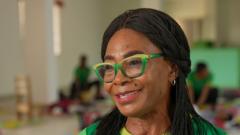In Nigeria, Cerebral Palsy is often a neglected condition, but one woman is determined to change that. Nonye Nweke, a single mother who founded the Cerebral Palsy Centre in Lagos, has dedicated her life to caring for children like Babatunde Fashola. Babatunde, affectionately called Baba, is 22 years old but just 70cm tall due to the neurological disorder. Abandoned at birth, he has been thriving at the centre for a decade, receiving the care he desperately needs.
Ms. Nweke, alongside her staff, works tirelessly to support Baba and 11 other children who rely on them for basic needs. Although there is no official data, cerebral palsy is endemic in Nigeria, with estimates suggesting around 700,000 affected individuals. A leading cause is untreated neonatal jaundice, a common condition in newborns. While most babies recover quickly, inadequate access to timely treatment often leads to severe neurological consequences, leaving children with permanent disabilities.
Dr. Chinyere Ezeaka, a paediatrician from the Lagos University Teaching Hospital, warns that without treatment within the first ten days of life, many infants risk incurring lasting brain damage that could result in severe cerebral palsy. Unfortunately, Nigeria suffers from a significant shortage of medical facilities capable of providing this essential care. With over 200 million citizens, there are only three privately run cerebral palsy centres in existence, highlighting a critical gap in assistance.
Reflecting on her own journey, Ms. Nweke recounted the distress of seeking help for her daughter, Zimuzo. After being turned away from a daycare because of her daughter's condition, Ms. Nweke decided to take matters into her own hands. Since Zimuzo, now 17, was diagnosed with cerebral palsy, Ms. Nweke has worked tirelessly to create a haven for other families struggling with similar challenges.
In the centre, caregivers provide thorough, attentive care to those they look after. Many children are fed intravenously, while others require muscular massages to manage their conditions. The facility receives no government funding and operates solely on donations, causing a backlog of over 100 applicants seeking admission.
"It's overwhelming," Ms. Nweke admits, as she describes the emotional and financial toll of care. The catering cost per child is around $1,000 monthly – a staggering amount in a nation where the minimum wage is just $540 a year. On top of financial strain, mothers like Ms. Nweke face social isolation as they endure the stigma linked to disability and mental health issues.
Yet, a new initiative called the Oscar Project aims to address the issues surrounding neonatal jaundice and related conditions, equipping health facilities across Nigeria with essential equipment for treatment, including ultraviolet light boxes. Founded by global disability advocate Oscar Anderson, who himself lives with cerebral palsy, the project plans to train healthcare workers and reach thousands of mothers in Lagos.
Despite the enormous challenges, Anderson's objective remains clear: to ensure that every infant receives timely screening and care for neonatal jaundice to prevent lifelong disabilities. Parents, midwives, and healthcare professionals are encouraged to fight for this cause, inspired by the stories of resilience coming from centres like Ms. Nweke's.
As Ms. Nweke continues her journey, she remains steadfast in her hope that through collective efforts, the plight of children with cerebral palsy will be addressed, ensuring they receive the care and respect they deserve. "She's my life,” Ms. Nweke says of Zimuzo, embodying the love and commitment that drives her work in the community.



















